#people-centered
Text
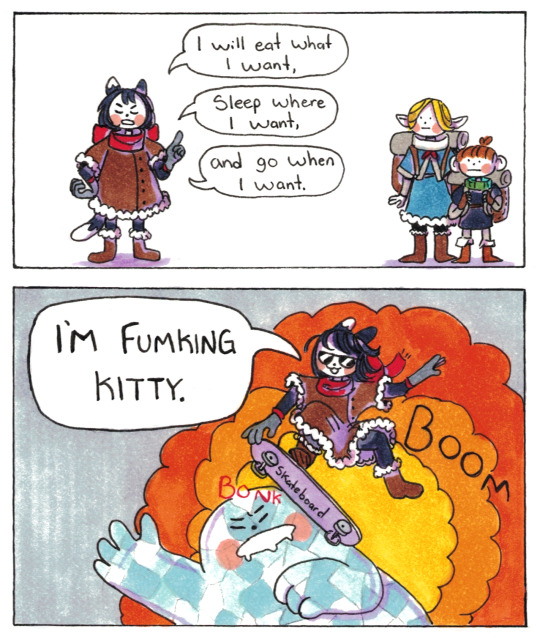
License to Kitty.
#dungeon meshi#izutsumi#marcille donato#chilchuk tims#I still stand by my tags on the Izutsumi character study piece I did in January - but I will repeat myself on a few lines here:#I *really* love this character. I love that all of the dungeon meshi crew are complicated and have difficult to love components.#But Izutsumi is a particular kind of hard to love. I foresee a lot of people being turned off by her abrasiveness and lack of teamwork.#She is very self-centered and openly goes against what the party agrees on.#She's a picky eater in a story that is 50% about eating good and healthy food!#It is in part about her growth but admittedly even *then* she remains rather true to her self-centeredness.#Even though she isn't as nice or funny or compassionate as the others...Izutsumi is still someone worth loving.#Even the more difficult people are someone worth loving.#And those people in turn are people who have something and someone they love.#She may be a girlcat but she is the most human of them all.#I hope that if you are an anime only watcher and are feeling put off by her at the moment; you'll give her a chance.#By the way: *yes* I worked very hard to draw that skateboard pose. It was worth it.#EDIT: HAPPY 500th POST OF POORLY-DRAW-MDZS!!! What a comic to commemorate the milestone with!
53K notes
·
View notes
Text
Part II - United Nations Chiefs of Police Summit (UNCOPS 2024).
Geopolitical tensions, the climate crisis, global mistrust and the dark side of technology, which Secretary-General António Guterres has called the "looming threats of the 21st century", are affecting the well-being and livelihoods of communities worldwide and the planet itself. National and United Nations Police are on the frontlines of averting and addressing these transnational threats.
The United Nations Police contribute to the Action for Peacekeeping (A4P) initiative and A4P+ priorities by building and supporting or, where mandated, acting as a substitute or partial substitute for host-State police capacity to prevent and detect crime, protect life and property, and maintain public order and safety in adherence to the rule of law and international human rights law.
---
Objectives:
A common vision and concrete commitments to further equipping the United Nations Police - UNPOL to effectively contribute to A4P and A4P+ priorities. Awareness of interlinkages between national and United Nations policing to increase global security.
Collective appreciation of the role of national and United Nations policing in overcoming systemic challenges affecting peacekeeping.
Joint understanding of the needs of the United Nations Police, including related to safety and security, and concrete Member State and Secretariat commitments to meet demands.
A common roadmap to realize the Secretary-General's vision of "a transformed United Nations police that is people-centred, modern, agile, mobile and flexible, specialized, rights-based and norm-driven", and that is also innovative, data-driven and tech-enabled.
United Nations Headquarters
UN Web TV
Watch (Part 2) United Nations Chiefs of Police Summit (UNCOPS 2024)!

#geopolitical tensions#unhq#uncops#global security#substitute for host state police capacity#partial substitute for host state police capacity#police personnel#military police#action for peacekeeping initiative#safety and security#a4p+ transformation initiative#overcoming challenges#policing#peacekeeping#violence prevention#collective appreciation#role of national and united nations policing#tech enabled#human security#data driven#people-centered#armed conflicts#united nations police
0 notes
Text
(1st meeting) International Dialogue on Migration 2024 - "Facilitating Regular Pathways to a Better Future: Harnessing the Power of Migration".
The International Dialogue on Migration (IDM) 2024 on the theme "Facilitating Regular Pathways to a Better Future: Harnessing the Power of Migration" is organized by the International Organization for Migration (IOM).
This session will contribute to:
An evidence-based understanding of the challenges and opportunities for migration today and tomorrow, including geopolitical crises and scaling-up of solutions, as well as ways to address gaps in current knowledge.
Identifying innovative and cutting-edge solutions that governments at local, national, and regional levels have already put in place or could develop in the future, to harness the potential of regular pathways for migration as part of a 360-degree approach to human mobility.
Unpacking how multilateral action and broad-based partnerships including private sector, diasporas and local communities, at the national, regional and global levels to facilitate regular and safe pathways for migration contribute to the response to some of the most distressing crises in the world, supporting integration and the transition to peace and prosperity.
Understanding how to achieve more accessible, people-centered, rights-based, accessible, sustainable and safe regular pathways, including key policy, operational and technical solutions that should be in place throughout the migration cycle.
Related Documents
Concept note
Watch the (1st meeting) International Dialogue on Migration 2024!
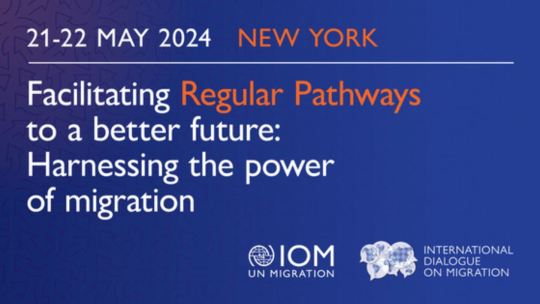
#UN Migration#International Organization for Migration (IOM)#International Dialogue on Migration#IOM#Power of migration#regular migration#regular pathways#multilateral action#diasporas#broad-based partnerships#safe migration#orderly migration#local communities#peace and prosperity#people-centered#right-based#integration#migration cycle#operational solutions#technical solutions
0 notes
Text
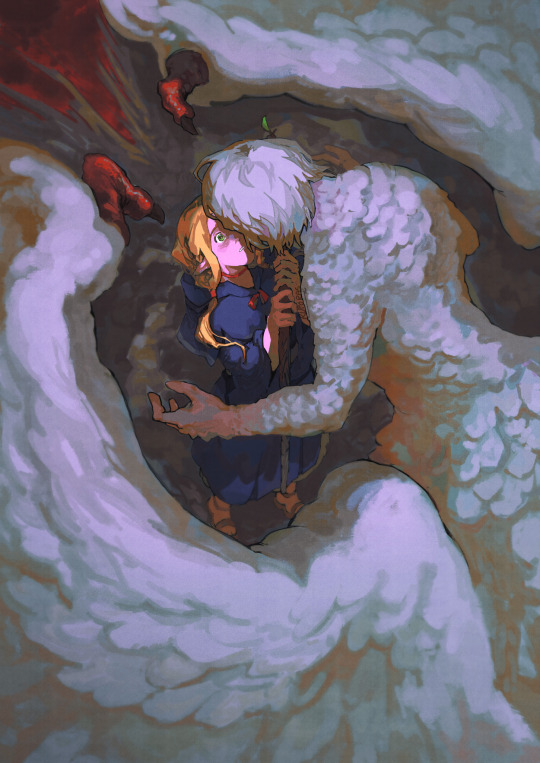
your love returns in tragedy (ID in alt)
#farcille#falin touden#marcille donato#dungeon meshi#dunmeshi#coming face to face with the consequences of acting out of love - marcille u will always be famous#dunmeshi is really a series that keeps on moving bc it's about so many different characters and centered on the journey#rather than like... introspectively on one singular individual so i dont think we see marcille dwell on it but we can see her fatigue#her shock and surprise in the recent ep “don't hurt her she's just confused” Gah. desperately trying to grasp everything thats going on and#not to lose hope. bc undoubtedly the remains she put together was falin's - that short moment of reprieve the party had was with falin#she was able to bring her back her magic did it!! but the violence the fatal swings was not falin at all.#just pondering about holding that guilt... it's such a huge responsibility to be in charge of life in the first place and yet it is#a burden she'll keep trudging with. defying the natural orders to keep the people she love alive... i Lauv her...#also shared sentiment with the rest of the fandom but God. Chimera Falin... she is Everything....#ruporas art
6K notes
·
View notes
Text





the restrained sniffer
#a doodley#anthro#furry#this 100% works more with their human forms but i am not immune to funny kitty#though i guess ''to wear'' doubles as like wearing.... it as a blanket...#sorry its so awkwardly broken up...tumblr allows so many pics so i get to make sure all the nice details are front and center#anyway im an overexplainer and in the past ive gotten so nervous about Action in my little comics#like. how will people know a character did [thing] if i dont show them doing it!!!!!#so this was also a mini exercise in omitting action...like i didnt waste panels drawing talon pulling the shirt on#or al putting on his horn toppers#finally; i had another related doodle idea i never drew out but might now if i remember to....#but wrt smunker's pillowcase and a resulting incident#point being Talon is a smell enjoyer...
2K notes
·
View notes
Text
To me, the best embodiment of modern capitalism is in the phrase "please hold, we are experiencing higher than usual call volume". I know it's a lie. You know it's a lie. But you still hear that line every time you call, regardless of the day or time, because it shifts the blame. It tries to prompt you to blame the other callers instead of asking, "Hey, why are they deliberately understaffing their call centers and making it so difficult to get help?" It takes a failing caused by a deliberate, profit-focused management choice, and turns it into a problem with the people using the system, rather than one with the system itself. And that pattern, to me, is the epitome of the modern corporate system.
#today in reliabledragon complains about call centers#I know this isn't that deep or anything#but like#this wording is a choice#and this pattern just shows up in so many places#it's infuriating#to see how effectively systems can shift the blame for their failures onto the actions of the people participating in them#anyway thank you for coming to my ted talk#my posts
25K notes
·
View notes
Text

#already seeing annoying things about my best friend pj bottoms. hear me out. dontttttttt care. where’s fun people#bottoms movie#bottoms 2023#yellowjackets#jennifer’s body#derry girls#sorry i’m like looking to piss people off be sude#*because i am soooooo tired of listening to people talk about any media#that does not center men. and especially in the ones that do#shut up <3 like please for the love of god#sorry if someone’s done this already
7K notes
·
View notes
Text
Thinking about. Stanley Pines. Once summer, not long after Weirdmaggedon. Sitting in his seat, staring at the tv but realising slowly he's not really watching TV, he's listening.
Listening to Soos, taking a tour group around the Shack, his voice confident and happy, eagerly telling tourists all kinds of tall tales. Soos, with his young son strapped to his chest, held close and dear to his heart, always knowing he is loved and wanted by his father.
Listening to Wendy and Melody, laughter turning to deeper conversations in the gift shop as Wendy pours out her latest dating drama and Melody listens sympathetically--not quite a mother, but an older sister figure is all Wendy wants at the moment.
Listening to a distant boom coming from the basement, a cause for some concern that fades quickly as three peals of laughter follow soon after. One deep and familiar, as comforting and close as the sound of a ship's motor and the open sea. One young and high, cracking with adolescent awkwardness. One loud and cackling, a hint of madness never quite leaving it but more settled than it used to be. And Stan figures it's probably time to send someone down to drag Ford, Dipper and McGucket upstairs before they forget what light is and get too nerdy.
Besides it's nearly dinner time, and he's listening to Mabel's steady, unrelenting chatter in the kitchen, punctuated by a few grunts of acknowledgment from Abuelita as they prepare a meal.
And Stan feels a strange, unusual sensation wash over him, something he hasn't felt for over half a lifetime, by a boat on a beach. A sensation of contentment, of security, of peace. And he realises that if he stood up and walked into any one of the rooms in the Shack he would be greeted with smiles and faces lighting up to see him and cheerful cries of his name.
And he looks down at the darned pig sleeping beside his chair and things, with oddly misty eyes, that he spent thirty years trying to find his brother again. And he succeeded--but somehow, he got more than that. He had formed around him, without even realising it, a family.
#wren rambles#gravity falls#grunkle stan#stanley pines#everything he ever did was for family#stanley pines they could never make me hate you#thinking about how he pulled people too him accidentally#and the people orbiting around him began to orbit around each other#and they form close bonds and friebdships#but Stanley pines is the epicenter#without him no one would have met#even soos and melody--they wouldnt have met without the twins' involvement trying to push soos out of his comfort zone#and the twins are only in gravity falls bc of stan#its all stan.#hes the center. the core. the heart.#and all he ever wanted was family#it took him a lifetime but he got there eventually
1K notes
·
View notes
Text
Someone on Reddit made the mistake of saying, "Teach me how this conflict came about" where I could see it.
Let me teach you too.
The common perception is that Jews came out of nowhere, stole Palestinian homes and kicked Palestinians out of them, and then bombed them for 75 years, until they finally rebelled in the form of Hamas invading Israel and massacring 22 towns in one day.
The historical reality is that Jews have lived there continuously for at least 3500 years.
There are areas, like Meggido iirc, with archeological evidence of continuous habitation for 7,000 years, but Jewish culture as we recognize it today didn't develop until probably halfway through that.
Ethnic Jews are the indigenous people of this area.
Indigeneity means a group was originally there, before any colonization happened, and that it has retained a cultural connection to the land. History plus culture.
That's what Jews have: even when the diaspora became larger than the number of Jews in Israel, the yearning to return to that homeland was a daily part of Jewish prayer and ritual.
The Jewish community in Israel was crushed pretty violently by the Roman Empire in 135 CE, but it was still substantial, sometimes even the majority population there, for almost a thousand years.
The 600s CE brought the advent of Islam and the Arab Empire, expanding out from Saudi Arabia into Israel and beyond. It was largely a region where Jews were second-class citizens. But it was still WAY better than the way Christian Europe treated Jews.
From the 700s-900s, the area saw repeated civil wars, plagues, and earthquakes.
Then the Crusades came, with waves of Christians making "pilgrimages to the Holy Land" and trying to conquer it from Muslims and Jews, who they slaughtered and enslaved.
Israel became pretty well depopulated after all that. It was a very rough time to live there. (And for the curious, I'm calling it Israel because that's what it had been for centuries, until the Romans erased the name and the country.)
By the 1800s, the TOTAL population of what's now Israel and Palestine had varied from 150,000 - 275,000 for centuries. It was very rural, very sparsely populated, on top of being mostly desert.
In the 1880s, Jews started buying land and moving back to their indigenous homeland. As tends to happen, immigration brought new projects and opportunities, which led to more immigration - not only from Jews, but from the Arab world as well.
Unfortunately, there was an antisemitic minority spearheaded by Amin al-Husseini. Who was very well-connected, rich, and from a politically powerful family.
Al-Husseini had enthusiastically participated in the Armenian Genocide under the Ottoman Empire. Then the Empire fell in World War One, and the League of Nations had to figure out what to do with its land.
Mostly, if an area was essentially operating as a country (e.g. Turkey), the League of Nations let it be one. In areas that weren't ready for self-rule, it appointed France or Britain to help them get there.
In recognition of the increased Jewish population in their traditional, indigenous homeland, it declared that that homeland would again become Israel.
As in, the region was casually called Palestine because that was the lay term for "the Holy Land." It had not been a country since Israel was stamped out; only a region of a series of different empires. And the Mandate For Palestine said it was establishing "a national home of the Jewish people" there, in recognition of "the historical connection of the Jewish people with Palestine and to the grounds for reconstituting their national home in that country."
Britain was appointed to help the Arab and Jewish communities there develop systems of self-government, and then to work together to govern the region overall.
At least, that was the plan.
Al-Husseini, who was deeply antisemitic, did not like this plan.
And, extra-unfortunately, the British response to al-Husseini inciting violent anti-Jewish riots was to put him in a leadership role over Arab Palestine.
They thought it would calm him down and perhaps satisfy him.
They were very wrong.
He went on to become a huge Hitler fanboy, and then a Nazi war criminal. He co-created the Muslim Brotherhood - which Hamas is part of - with fellow fascist fanboy Hassan al-Banna.
He got Nazi Party funding for armed Muslim Brotherhood militias to attack Jews and the Brits in the late 30s, convincing Britain to agree to limit Jewish immigration at the time when it was most desperately needed.
He started using the militias again in 1947, when the United Nations voted to divide the mandated land into a Jewish homeland and a Palestinian one.
Al-Husseini wouldn't stand for a two-state solution. He was determined to tolerate no more than the subdued, small Jewish minority of second-class citizens that he remembered from his childhood.
As armed militias increasingly ran riot, the Arab middle and upper classes increasingly left. About 100,000 left the country before May 1948, when Britain was to pull out, leaving Israel and Palestine to declare their independence.
The surrounding nations didn't want war. They largely accepted the two-state solution.
But al-Husseini lobbied HARD. And by mobilizing the Muslim Brotherhood to provide "destabilizing mass demonstrations and a murderous campaign of intimidation," he got the Arab League nations to agree to invade, en masse, as soon as Britain left.
About 600,000 Arabs fled to those countries during the ensuing war.
Jews couldn't seek refuge there; in fact, most of those countries either exiled their Jews directly, confiscating their property first, or else made Jewish life unlivable and exploited them for underpaid or slave labor for years first.
By the time the smoke cleared and a peace treaty was signed, most of the Arab Palestinian community had fled; there was no Arab Palestinian leadership; many of the refugees' homes and businesses had left had been destroyed in the war; and Israel had been flooded with nearly a million refugees from the Arab League countries and the Holocaust - even more people than had fled the war.
That was the Nakba. The one that gets portrayed as "750,000 Palestinians fled or were expelled!" in the hope that you'll assume they were expelled en masse, their beautiful intact homes all stolen.
Egypt had taken what's now the Gaza Strip in that war, and Jordan took what's now the West Bank - expelling or killing all the Jews in it first.
(Ironically, Jordan was originally supposed to be part of Israel. Britain, inexplicably, cut off what would have been 75% of its land to create Jordan.
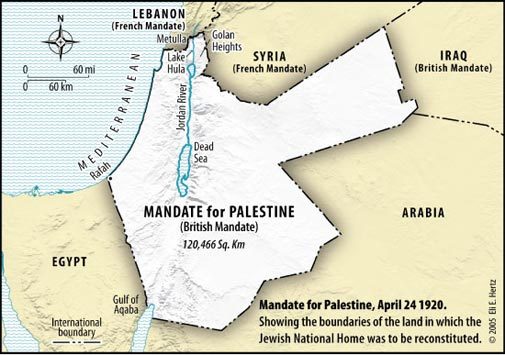
Even more inexplicably, nobody ever talks about it. I've never seen anyone complain that Jordan was stolen from Palestinians. Possibly because Jordan is also the only country that gave Palestinian refugees full citizenship, and it's about half Palestinian now.
Israel is nearly 25% Arab Palestinians with full citizenship and equal rights, so it's not all that different -- but the fundamental difference of living in a country where the majority is Jewish, not Muslim, probably runs pretty deep.)
Anyway: that's why Palestine is Gaza and the West Bank, rather than being some contiguous chunk of land. Or being the land set aside by the U.N. in 1947.
Because Arab countries took that land in 1948, and treated them as essentially separate for 20 years.
Israel got them back, along with the Golan Heights and the Sinai Peninsula, in the next war: 1967, when Egypt committed an act of war by taking control of the waterways and barring Israel from them. It gave the Sinai back to Egypt as part of the 1979 peace accords between Egypt and Israel.
Israel tried to give back the Gaza Strip at the same time. Egypt refused.
Palestine finally declared independence in 1988.
But Hamas formed at about the same time. Probably in response, in fact. Hamas is fundamentally opposed to peace negotiations with Israel.
Again: Hamas is part of a group founded by Nazis.
Hamas has its own charter. It explains that Jews are "the enemy," because they control the drug trade, have been behind every major war, control the media, control the United Nations, etc. Basic Nazi rhetoric.
It has gotten adept at masking that rhetoric for the West. But to friendlier audiences, its leaders have consistently said things like, "People of Jerusalem, we want you to cut off the heads of the Jews with knives. With your hand, cut their artery from here. A knife costs five shekels. Buy a knife, sharpen it, put it there, and just cut off [their heads]. It costs just five shekels."
(Palestinians were outraged by this speech. Palestinians, by and large, absolutely loathe Hamas.
It's just that it's not the same to say that to locals, as it is to say it where major global powers who oppose this crap can hear you.)
Hamas has stated from the beginning that its mission is to violently destroy Israel and take over the land.
It has received $100M in military funding annually, from Iran, for several years. Because Iran has been building a network of fascist, antisemitic groups across the Middle East, in a blatant attempt to control more and more of it: Hezbollah in Lebanon. The Houthis in Yemen.
Iran has been run by a very far-right, deeply antisemitic dictatorship for decades now, which pretty openly wants to take down both Israel and the U.S.
Last year, Iran increased Hamas's funding to $350M.
The "proof of concept" invasion of Israel that Hamas pulled off on October 7th more than justifies a much bigger investment.
Hamas has publicly stated its intention to attack "again and again and again," until Israel has been violently destroyed.
That is how this conflict came about.
A Nazi group seized power in Gaza in 2007 by violently kicking the Palestinian government out, and began running it as a dictatorship, using it to build money and power in preparations for exactly this.
And people find it shockingly easy to believe its own hype about being "the Palestinian resistance."
As well as its propaganda that Israel is not actually targeting Hamas: it's just using a literal Nazi invasion and massacre as an excuse to randomly commit genocide of the fraction of Palestine it physically left 20 years ago.
Despite the fact that Palestinians in Gaza have been protesting HAMAS throughout the war.
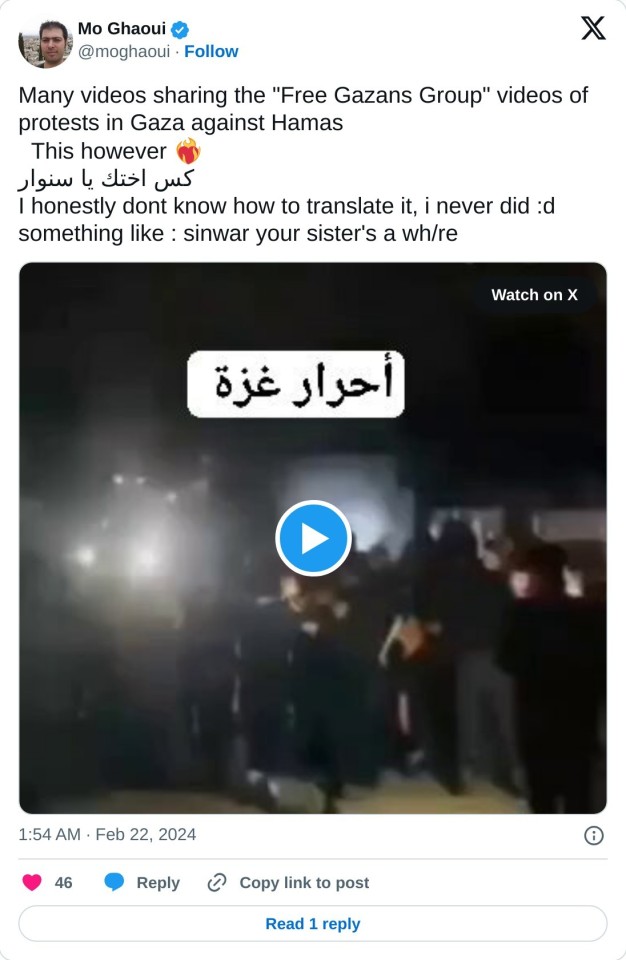
#free palestine#free gaza from hamas#free everyone from hamas it's awful#we want to live movement#free gazans group#center the people directly affected#Ironically it's almost exclusively zionists who know about and support the actual activists in Palestine#because Zionism is a real Jewish term for self-determination not something you can redefine to demonize us#and the pro-hamas movement is inherently both antisemitic and anti-Palestinian#wall of words#jumblr#jewish history#palestinian history
1K notes
·
View notes
Text
crazy seeing rightwing people calling the barbie movie anti-men considering i’m pretty sure the “i’m just ken” song did more good for men’s mental health than any number of their shitty little incel forums combined
#not su /#genuine banger telling men not to define their worth by having a gf or trying to dominate others#and they still can’t handle the movie quipping about the state of gender relations by saying kens will one day be as important in society#as women today (which is an excellent prompt for people to realize how unequal the world still is and be unsettled but people still don’t#get it) and it’s just. So revealing that you can’t handle being treated like you’re not the center of the world for 5 seconds#barbie movie#barbie#barbie 2023
5K notes
·
View notes
Text
@enderfore replied to your post “What do you think of Rook's savanaclaw card? <333”:
Chenya pic where???? I can barely see anything in that room there so much going on, rooks such a lil freak (affectionatr)
he's under the row of flags on Neige's side of the room, next to the big Neige poster with the yellow background (look just to the right of the hand holding the apple)! he's REAL little; once you know he's there you can kind of see him in-game, but I only noticed him in the first place because I took a screenshot and was having fun zooming in on all the details!
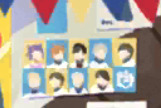
I think that's either Hop or Snick and Dominic on either side of Neige, but if the others are meant to be anyone in particular I don't recognize 'em. though I do love all the absolutely terrifying implications of Rook having this. was this some kind of officially-published merchandise (and if so, why) or did Rook like...go hunting through the RSA trash to find this random student lineup just because it included Neige, and has had it hanging proudly on the wall ever since. (I mean, he definitely did do this, I don't know why I'm asking. the real question is why he hasn't cut out little pictures of his own face and stuck them over everyone else's yet.)
there is seriously SO MUCH in this room. how did Rook manage to keep this hidden for three years. also, somebody give this background artist a raise immediately.
#screenshot#twisted wonderland#twisted wonderland spoilers#twisted wonderland episode 7 spoilers#twisted wonderland book 7 spoilers#twisted wonderland episode 7 part 8 spoilers#twisted wonderland book 7 part 8 spoilers#this just in: the savanaboys are canonically very respectful of each other's privacy and right to their own personal space#the other option is that no one actually wants to see why rook is always so desperate to keep people out of his room#but these are not mutually exclusive! leona respects your boundaries through genuinely not giving a shit. ⭐️#god. rook's room really was somehow exactly what i expected but also so much more than i could have ever imagined.#the literal divide down the center including his BEDSHEETS AND PILLOW#do you think rook makes sure to sleep precisely down to the mm in the center of his bed each night what am i saying of course he does#he has also probably trained his eyes to move independently so he can look at both of the hanging posters above his bed at once#savanarook really was such a treasure. i shall miss him.#(i have also decided based on basically nothing that because there's a banner with vil's unique magic name on it)#(and the corresponding banner for neige says '[someday my] prince will come')#(that i'm going to headcanon this as being neige's unique magic. i must know what it does. the possibilities are TANTALIZING)
752 notes
·
View notes
Text

The musical episode.
[First] Prev <–-> Next
#poorly drawn mdzs#mdzs#jin guangyao#nie mingjue#Remember jin guangyao: If you do any treachery you will face the wrath of five horses.#When are the horses going to come into play? You'll see.#s2.ep8 had beautiful music... I listened to it on loop while drawing!#Good music to chill out to before you fly into a rage.#This episode really cements how JGY's mind works - It is a matter of long-term outcomes at the sake of nearly everything else.#Morals do not matter to him if the outcome is more favourable.#and at the center of it all - he has learned that the only person he can truly trust is himself.#In turn - the only person his actions benefit are himself.#He will do anything and everything it takes to reach a position of power - not just for the power. But because it means safety.#Because it was something he was denied and the idea of not having control in his life again is unforgivable.#'Happiness' isn't a goal. We are looking at someone still stuck at the bottom of Maslow's hierarchy of needs.#Everything and everyone is a piece in a game. Bonds and friendships are assets. People are dispensable.#He wants to climb for the sake of climbing. He wants praise and recognition because he feels it is deserved. It's all so hollow.#We could go deeper into his psyche on this.#But these are also tags under a comic in which 'evil penis music' is the punchline.
6K notes
·
View notes
Text
Sukuna is Peak Gap Moe. I’ll never be over this. This bastard talks tough, eats people, and kills like a woodchipper and yet…he is a poetic little sap. Getting mad over an improper haikus, the misidentification of flowers…and confessing his feelings to Gojo Satoru under several layers of wordplay no one except those well-versed in ancient Japanese would catch.
I've been over this in greater detail in Sukuna's Negative Rizz, but @tangsakura added more context in the replies to that post, making Sukuna's use of 凡夫 (bonpu) for Gojo even gayer.
In summary, 凡夫 (bonpu) can be translated as painfully ordinary or unenlightened. But in the individual kanji readings, 凡 is mediocre and 夫 is husband. You could read this as Sukuna calling Gojo his mediocre husband. And that's just the modern readings! The ancient readings...


So you can read this line from Sukuna as the following:
“You were born in an era without me and hailed as 'The Strongest'
1) And yet you turned out to be…painfully ordinary.”
2) And yet you turned out to be…unenlightened.”
3) And yet you turned out to be…a mediocre husband/wife/spouse.”
4) And yet you turned out to be…the ordinary one who could stand by my side.”
Sukuna seems to be saying these things all at once. (It’s no different than the Megumi Activities wordplay he uses with Enchain. Alt. link if the Twitter dies.) Gojo apparently makes him feel very conflicted. He’s boring, he can do better, he shouldn’t even call himself the Honored One, he’s his equal, they’re married. The irony here is that no one except Sukuna can understand this.

#cactus shut up#Also he said this live on TV and the chapter ended on ''the one who will teach you love is…''#I’m isolating this from Sukuna’s Negative Rizz because I want more people to see and understand Sukuna called Gojo his wife.#Well his girlhusband boywife spouse who is also totally mid and ordinary and the one who could stand by his side.#When the ''Sukuna is having dead wife flashbacks'' is no longer a joke.#I am once again asking. When the everloving fudge did Sukuna decide they were married.#I understand wedding ceremonies weren’t really a thing in the Heian Era. But what the hell Sukuna.#What a fudging sap. I hate him. I’m going to call him slurs.#When I say this motherfudger is Beatrice I’m serious.#He killed Gojo by making him the center of his world and expected this physics major to understand the abstract symbolism of the violence.#Sukuna doesn’t know what to do with his feelings for Gojo and he made it everyone’s problem.#Gege’s toxic doomed yaoi has me Obsessed.#sukugo#ryomen sukuna#jujutsu kaisen#jjk spoilers
498 notes
·
View notes
Text
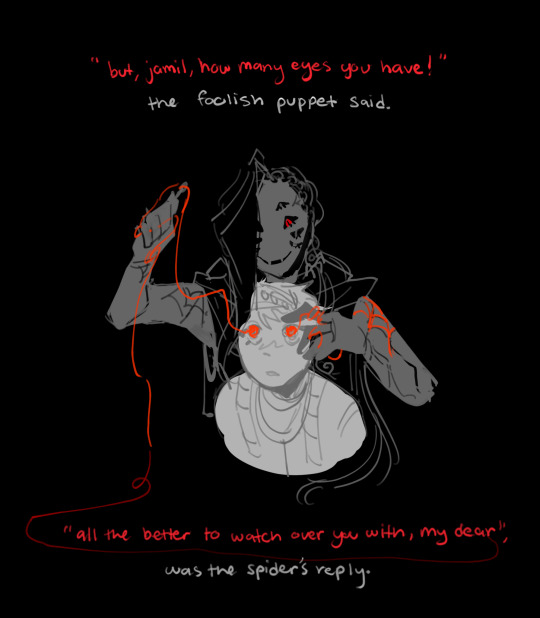
the web - fear of manipulation and lost control made manifest
#twst#twisted wonderland#jamil viper#kalim al asim#twst tma au#tma#heartscribbles#dont tag as ship#honestly this piece stands alone w/o the tma au tag but i just want it there for context#but for the very niche audience of tma twst people im sure you all understand me when i say jamil is SOOOOO webcoded#i have a lot of thoughts on a twst tma au that will probably come out later#most of them center around web!jamil tbh#there is something incredibly funny about aligning (guy with horrid fear of all bugs ever) with (spider themed fear god)#i will keep doing it
2K notes
·
View notes
Text
honestly dan was masterful in avoiding letting too much on in BIG because here we are 5 years later with people ADAMANT that “and obviously we were more than friends, but it was more than just romantic” somehow did not mean they were together
#the point was to not have their relationship be the center of him coming out and boy did it work. to the extent that people will just deny#there’s nothing there. be fr.#dan and phil#dnp#phan
434 notes
·
View notes
Text
I love how one of the defining characteristics of the Locked Tomb series is that it’s purportedly lesbian in nature, and yet the yuri is so toxic it’s barely edible
#the locked tomb#gideon the ninth#gideon nav#harrow the ninth#harrowhark nonagesimus#griddlehark#ianthe tridentarius#harryanthe#nona the ninth#tlt#gay#lesbian#this is not a dig obviously#I love the word building and the way that lesbianness is centered#I just wanted to make a funny joke#because the romance is definitely something LMAO#I’ll admit I added purportedly because some people might not think it’s lesbian#how dare I appeal to them#this will not happen again soldiers I’ll continue the agenda hence
317 notes
·
View notes